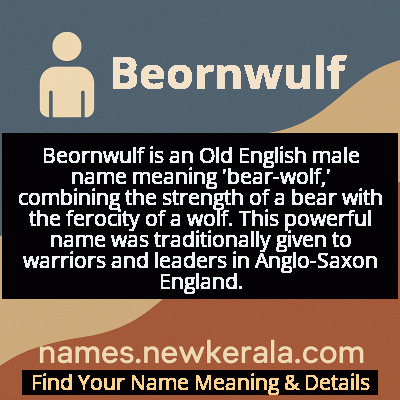Beornwulf Name Meaning & Details
Origin, Popularity, Numerology Analysis & Name Meaning of Beornwulf
Discover the origin, meaning, and cultural significance of the name BEORNWULF. Delve into its historical roots and explore the lasting impact it has had on communities and traditions.
Name
Beornwulf
Gender
Male
Origin
Anglo
Lucky Number
8
Meaning of the Name - Beornwulf
Beornwulf is an Old English male name meaning 'bear-wolf,' combining the strength of a bear with the ferocity of a wolf. This powerful name was traditionally given to warriors and leaders in Anglo-Saxon England.
Beornwulf - Complete Numerology Analysis
Your Numerology Number
Based on Pythagorean Numerology System
Ruling Planet
Saturn
Positive Nature
Ambitious, efficient, realistic, and authoritative.
Negative Traits
Materialistic, stressed, confrontational, and can be overly ambitious.
Lucky Colours
Dark blue, black.
Lucky Days
Saturday.
Lucky Stones
Blue sapphire, amethyst.
Harmony Numbers
2, 4, 6.
Best Suited Professions
Business leaders, managers, financial services, law enforcement.
What People Like About You
Leadership, determination, organizational skills.
Famous People Named Beornwulf
Beornwulf of Mercia
King
Ruled Mercia 823-826 AD during decline of Mercian supremacy
Beornwulf the Ealdorman
Nobleman
Prominent Anglo-Saxon landowner and local ruler
Beornwulf of Lindsey
Regional Ruler
Recorded ruler in the historical Kingdom of Lindsey
Name Variations & International Equivalents
Click on blue names to explore their detailed meanings. Gray names with will be available soon.
Cultural & Historical Significance
The name's cultural significance extends beyond its royal bearer to represent broader Anglo-Saxon societal values. It exemplifies how pre-Christian Germanic animal symbolism persisted into Christianized England, with the bear representing immense strength and protective power, while the wolf symbolized hunting prowess and pack loyalty. The combination created an ideal of leadership that balanced individual martial capability with loyalty to one's people. This naming tradition underscores how Anglo-Saxon culture viewed names as destiny-shaping elements, particularly for those born into leadership positions where these animal qualities were essential for survival and success.
Extended Personality Analysis
The name Beornwulf suggests a personality characterized by formidable strength, protective instincts, and natural leadership abilities. Individuals with this name are often perceived as having a powerful physical presence combined with strategic intelligence—the bear's protective strength merged with the wolf's pack loyalty and hunting prowess. They tend to be decisive, action-oriented people who prefer direct approaches to challenges and inspire confidence through their demonstrated capability. Their protective nature makes them fiercely loyal to family and community, while their strategic thinking enables them to navigate complex situations effectively.
This combination of animal symbolism suggests someone who balances solitary strength with social intelligence. The bear aspect indicates a person who can stand alone when necessary, possessing inner resilience and the ability to defend themselves and others. Meanwhile, the wolf element points to strong social bonds, understanding of group dynamics, and the ability to work cooperatively toward common goals. Such individuals often excel in leadership roles where both physical courage and strategic planning are required, and they typically command respect through their actions rather than demanding it. While potentially intimidating to outsiders, they prove deeply loyal and protective to those within their circle of trust.
Modern Usage & Popularity
In contemporary naming practices, Beornwulf remains an exceptionally rare choice, primarily confined to historical enthusiasts, reenactment communities, and families with strong connections to Anglo-Saxon heritage. Its usage is almost exclusively found in English-speaking countries, particularly Britain where interest in Old English names has seen a minor resurgence. The name's complexity, archaic sound, and strong historical associations make it impractical for mainstream use, but it holds appeal for those seeking distinctive names with deep cultural roots. It occasionally appears in historical fiction and media portrayals of the Anglo-Saxon period, helping maintain its cultural presence. The name's revival fits within broader trends of rediscovering medieval European names, though its specific warrior connotations and challenging pronunciation limit its widespread adoption. Most modern uses likely occur as middle names or within families deeply committed to historical naming traditions.
Symbolic & Spiritual Meanings
Symbolically, Beornwulf represents the powerful fusion of two dominant animal archetypes from Germanic mythology and folklore. The bear symbolizes immense physical strength, protective power, earthly connection, and solitary resilience—qualities associated with guardianship and unwavering defense. The wolf brings symbolic meanings of intelligence, loyalty, strategic hunting, pack cohesion, and relentless pursuit. Together, they create a comprehensive symbolic representation of ideal leadership that balances individual capability with social responsibility. This combination suggests someone who can both defend their people through personal strength and lead them to success through strategic intelligence and loyalty. The symbolism extends to represent the balance between civilization and wilderness, as both animals were respected but feared creatures that embodied the untamed power of nature that early medieval societies both relied upon and sought to master in their leaders.

